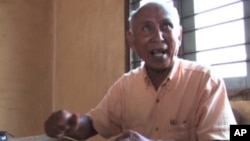As the United Nations begins a long-awaited trial of four former Khmer Rouge leaders, a survivor of the regime's most notorious prison gives VOA a tour of Tuol Sleng, or S-21, in Phnom Penh.
|
Quick Facts: Tuol Sleng Prison
|
Watch Chhum Mey recollect his time inside S-21
Read the Transcript:
This is me, among the seven who survived. I was 48 at that time, now I'm 80.
Of the seven only three survived, Bum may, Van Nath and me.
They took off my clothes in that room, my pants, my shirt, and only left my underwear. And they handcuffed me and they took a scarf to blindfold me. Then we did not see the stairs so they pulled our ears, they said "you walk up the stairs". When we go down, they said "you go down the stairs", pulling down our ears because they already blindfolded us.
This is where I was kept. When I got here they dragged my ear and said to get inside. I was made to sit down and my legs were chained like that. Then they released the handcuff and took off my blindfold and they put on a curtain so that we could not see each other and talk to each other. And this is for us to defecate, but made sure we did not spill our waste on the floor, otherwise we will be forced to lick it because there is nothing I could use to wipe it off.
They beat me for 12 days and nights in a row and my back swelled so hard that I could only sleep on one side. Then I made a sound with the chain. We were beaten with a stick for 200 times because they accused us of trying to break the chain.
I had nothing to sleep on only my underwear. And I have to sleep on the floor. I was given only two spoons of porridge per day, not rice, only watery porridge. And they gave us a little water and told us not to ask for more. If we did, we would be beaten.
They locked us like this. And they put a padlock here.
They have a typewriter here on the table. When they questioned a prisoner they asked: "When did you joined the CIA? How many of you joined it?". Then they typed the answers. If we did not answer, they would beat us and started asking us again. How many of you joined the CIA or the KGB. If we did not answer, they keep beating us. They only asked about CIA and KGB. They asked nothing else. I can survive because only I could fix the typewriter when it broke down. That was why they kept me alive but they said I would be destroyed later.
I have to tell my children, grandchildren and the world what happened [here]. No matter what nationality; Chinese, Vietnamese, Cham (an ethnic minority in Cambodia & Vietnam) and (Javanese), I will tell all of them. I don't hide anything. If they come, I will tell them.




